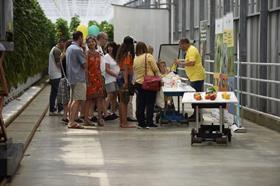
As a so-called ‘demonstration’ farm, you could be forgiven for thinking that the emphasis at Chichester-based pepper grower Tangmere Airfield Nurseries is on teaching best practice in sustainability. But in reality, visits to the farm are very much a two-way exchange – of knowledge, ideas and experiences.
The 30-hectare glasshouse complex, which – as its name suggests – sits in an old airfield, receives a wide range of visitors, including schoolchildren, other growers and MA students. And it’s not just about showing people how the farm operates; it’s also about convincing students and producers of how efficient sustainable growing methods can be.
“I think there’s an appetite for sustainable farming if growers can see the benefits of it,” says technical crops manager Mark Knight. “As sustainable and environmentally friendly as a growing technique might be, most producers will only adopt it if they can see how it will make their business either more efficient or more profitable. There needs to be a genuine incentive.”
Integrated Farm Management – a farming model designed to increase productivity while protecting valuable resources – is about making positive changes to your farming practices wherever possible to get maximum gain from minimum impact. And rather than focusing on one specific area of their operations, growers are encouraged to take a holistic approach and think carefully about how they could make each element of their business more efficient and environmentally friendly.
The three areas that Tangmere Nurseries really excels in are energy management, integrated pest management and water management, using carefully honed techniques to do more with less. And perhaps the most interesting production method employed by the grower is the pest-in-first system, which at first explanation seems counterintuitive.
As an alternative to pesticides, Tangmere uses biological pest controls such as Spidex, but instead of introducing the beneficial insect straight away, growers allow the pest, red spider mite, to first establish itself on the crop. “The predator needs the pest present because otherwise it dies – the pest is its only food source,” explains Knight. “You need to understand how the different insects and mites work because in nature there’s a natural balance whereas in a glasshouse you have to create that balance yourself.”
Knight is clear about the benefits of using biological controls rather than synthetic pesticides, stressing that each time you spray a pepper plant, it’s as if it’s been “slapped” or “punched”. “The plant will expend energy recovering, but as a grower we’d like to put some of that energy into what it should be doing, which is the formation of the fruit and getting the quality right,” Knight says. “We do still use pesticides but it’s only for spot sprays – to address a specific issue in a specific area.”
When it comes to energy and water management, the emphasis is very much on minimising waste. The company’s combined heat and power system generates heat, carbon dioxide and electricity to power the glasshouses and help the plants grow, while a closed-loop irrigation system allows the same fertilisers and irrigation water to be used over and over again. “We have a permanent supply of CO2; we can store heat in a buffer tank and use it as and when we need to; and the irrigation system allows us to UV filter the water so we can reuse the fertiliser without recirculating too many negative pathogens,” explains Knight.
Smaller, but arguably equally important, sustainability measures include trials to make all the string and clips used to support the pepper plants biodegradable. Tangmere has been trialling different types of biodegradable string for almost a decade and is now confident it has finally found the right material.
“As always, we’ve been looking for a product that functions as good as normal without any penalties,” Knight says. “All of these micro-level changes take quite a while to decide upon and implement – it’s not as if the right product’s just sitting there and nobody’s using it – but we’re willing to do some trial and error to see how we can make a positive difference.”
Going forward, businesses like Tangmere will play a key role in persuading others to follow suit. And although it can take time to implement some of these environmental changes, the message is clear: sustainability pays – it doesn’t have to be a trade-off.
Q&A
What is a LEAF Demonstration Farm?
A working, commercial farm practising Integrated Farm Management (IFM). LEAF demonstration farmers communicate, discuss and demonstrate IFM best practice among other farmers, while also playing a crucial role in promoting sustainable production methods to wider groups such as politicians, industry and students.
What is the LEAF Marque?
A farm assurance system which shows that food has been grown sustainably, with the environment in mind. The marque is held by producers that meet LEAF’s exacting standards of sustainable farming practice, and certification is underpinned by IFM principles.
A producer employing these will demonstrate site-specific and continuous improvement across the whole farm, including: organisation and planning, soil management and fertility, crop health and protection, pollution control and by-product management, animal husbandry, energy efficiency, water management, landscape and nature conservation, and community engagement.



